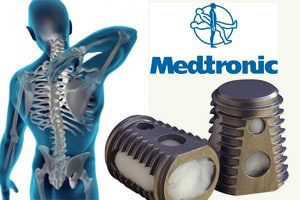
Five Infuse patients have brought a lawsuit against Medtronic Inc. over its controversial bone graft product. The recent litigation was recently filed in California Superior Court. Allegations all involve that the patients were implanted with Infuse off-label and have, as a result, suffered from serious complications that include bone overgrowth and neuropathy. Infuse is a […]
 Five Infuse patients have brought a lawsuit against Medtronic Inc. over its controversial bone graft product. The recent litigation was recently filed in California Superior Court.
Five Infuse patients have brought a lawsuit against Medtronic Inc. over its controversial bone graft product. The recent litigation was recently filed in California Superior Court.
Allegations all involve that the patients were implanted with Infuse off-label and have, as a result, suffered from serious complications that include bone overgrowth and neuropathy.
Infuse is a genetically engineered, synthetic, recombinant human Bone Morphogenetic Protein (rhBMP-2) that was approved by the U.S. Food and Drug Administration (FDA) for specific uses: To stimulate spine growth in patients who suffer from lower spinal degenerative disease, for use in one type of spinal surgery, and for use in some dental procedures. Infuse is not approved for use on the upper, or cervical spine. Despite this, the bone graft product is broadly used in off label procedures. In fact, on July 1, 2008 the FDA issued a notification that warned of serious complications associated with the use of Infuse in cervical spinal fusions.
Medtronic’s Infuse has been tied to controversy, patient injuries, and mounting lawsuits. In fact, the bone graft product was recently associated with increased cancer risks, according to a Stanford University study published in the September 4, 2013, edition of The Journal of Bone & Joint Surgery. The study revealed that a dose of at least 40 milligrams of Infuse is tied to increased risks of new cancer.
The Stanford research results were released after other findings were published from two independent studies overseen by Yale University in which it was found that Infuse may lead to a number of harmful, sometimes deadly, side effects, including retrograde ejaculation, pain, and extraneous bone growth, according to the June 2013 edition of the medical journal Annals of Internal Medicine. Both the Stanford and the Yale-overseen studies revealed cancer among side effects tied to Infuse. The Yale studies also found that there is little, if any, difference in the efficacy of Infuse when compared to traditional bone graft. In traditional bone graft, the patient’s own tissue is used.
Also at that time, Gary Falkowitz, Managing Attorney from Parker Waichman LLP, stated that, “We have yet another study that provides us with compelling detail regarding the increased risk of injury among patients who undergo a Medtronic Infuse spinal fusion.” He added, “As we have noted, why would a patient choose this device over a traditional bone graft—an option that is not only just as effective but, according to the Stanford study, as well as the Yale-overseen studies, safer?”
On July 1, 2008 the FDA issued a notification concerning dangers associated with the off-label use of Infuse and discussed numerous and serious complications when Infuse is used in cervical spine fusions, including excessive swelling in the neck, compressed airways, difficulty breathing, problems swallowing, and nerve damage. The FDA specifically pointed out that it had received reports of “life-threatening complications associated with” Infuse when used off-label in the cervical spine and reiterated that, “these products are not approved by FDA for this use.”
The FDA also indicated that it had received nearly 40 reports of complications tied to off-label Infuse use in cervical spine fusion that occurred within two days and two weeks following the Infuse procedure. The reports were received from 2003-2004 to June 2008. “hen airway complications occurred, medical intervention was frequently necessary. Treatments needed included respiratory support with intubation, anti-inflammatory medication, tracheotomy and, most commonly, second surgeries to drain the surgical site,” the agency indicated.
The FDA announced that patients implanted with Infuse in their cervical spines should be aware that airway complication symptoms include difficulty breathing or swallowing and/or swelling of the neck, tongue, mouth, throat and shoulders, or upper chest area; that medical attention must be immediately sought at the first sign of an airway complication; and that airway complications are likelier to occur from two to 14 days following the procedure.
Medtronic’s marketing of Infuse has long been the focus of growing controversy over the way in which Infuse research was conducted, including that such research was Medtronic-funded. Medtronic has been accused of promoting Infuse off label, of downplaying Infuse’s risks, and of overstating Infuse benefits. This led to a Senate probe, the FDA warning, and the independent studies.


